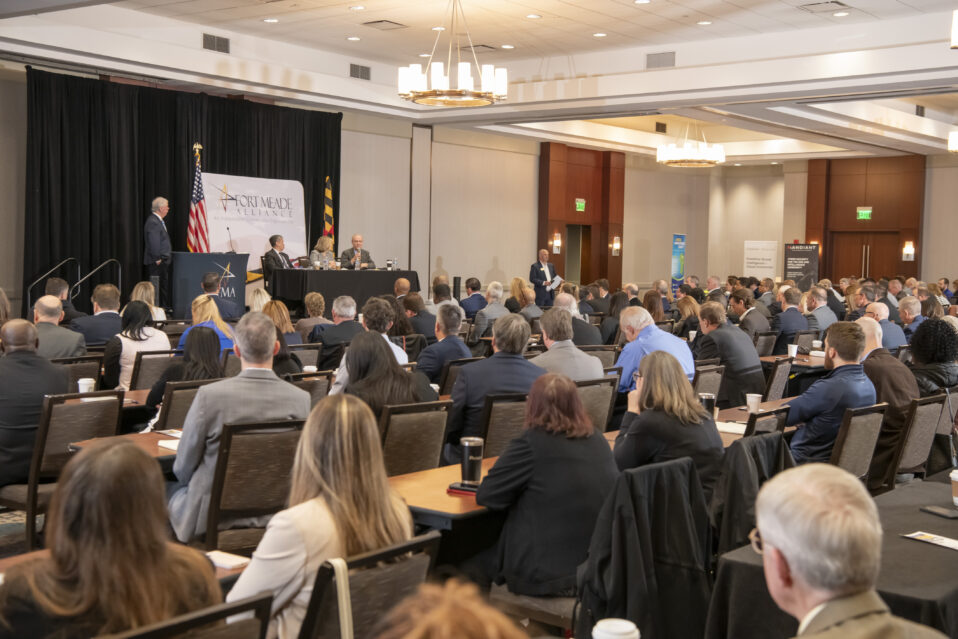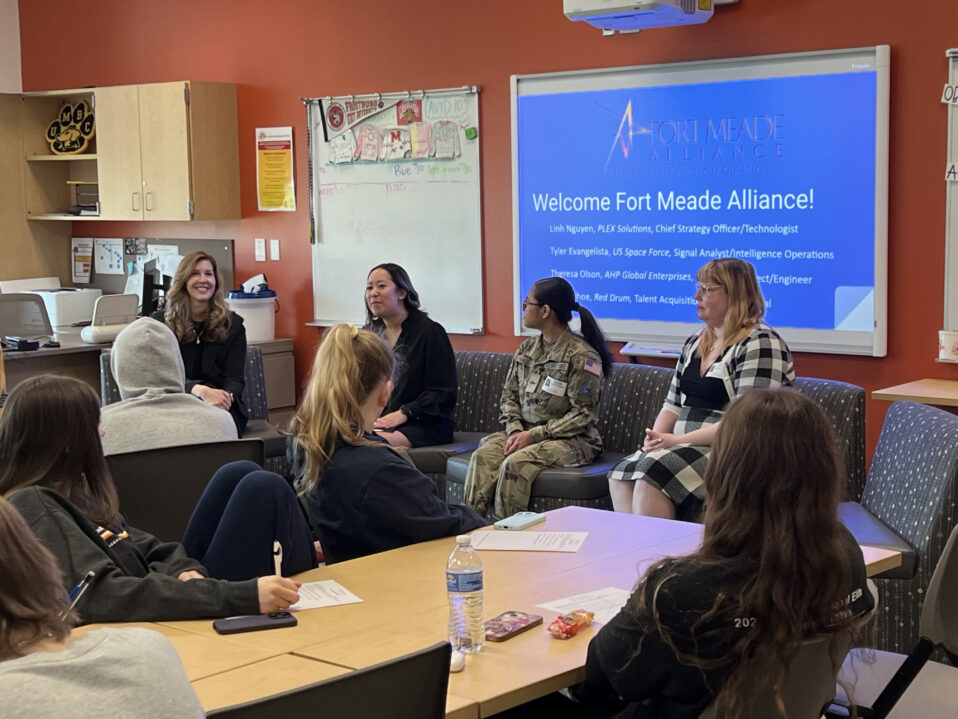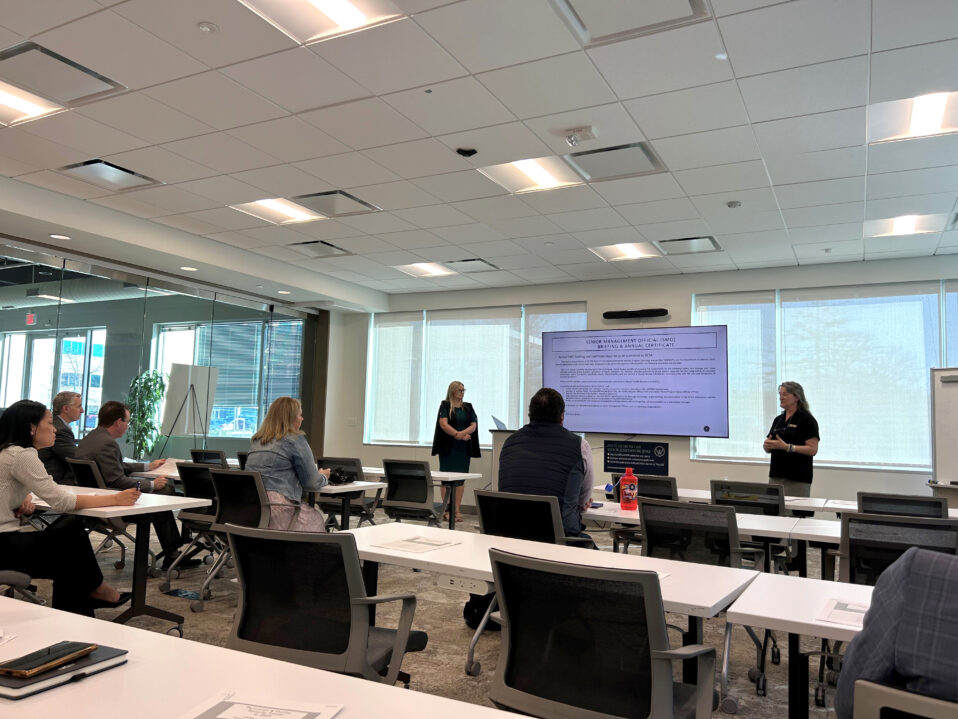From supporting national security missions, business success and talent development in the midst of a pandemic to helping elementary school children improve their reading, the latest FMA Key Leaders Series provided a wealth of insights on how to create healthy companies and communities during a very challenging year.
Kathy Warden – Chairman, Chief Executive Officer and President of Northrop Grumman Corporation – and Chris Van Hollen – U.S. Senator for the State of Maryland – fielded a range of questions from FMA members during the hour-long virtual gathering.
At the outset of the pandemic, Northrop Grumman set up a war room to determine how to safely continue its mission-essential work, Warden said. Heightened communications with customers, business partners and employees generated crucial, ongoing insights into what everyone needed to thrive in this new environment.
“I don’t just mean survive,” Warden said. “I mean do well because there is plenty of opportunity. We have work in this industry. We need to keep doing that important work and we can’t afford to have suppliers go out of business who are a vital part of offering solutions to our warfighters and our national security decision makers.”
Northrop Grumman strategically flowed work to suppliers that were struggling most and secured early payments to suppliers, supported by both a provision in the CARES Act and nearly $1 million of Northrop Grumman’s own funds.
“Dozens of suppliers in the Fort Meade area have benefited from this and I know some of our peers have done the same,” Warden said. “We just recognized that we were all in this together and we needed to come out and face better times together. We didn’t want to lose anyone who was a valuable contributor along the way.”
Warden also urged contractors to continue networking through the pandemic. Northrop Grumman is seeking new partners for some work and looking to move some work back to America. “Don’t think it is just a hunker down time,” she said. “There is opportunity in the midst of the threats we are facing.”
Opportunities are evident in the Fort Meade Region’s economic statistics, Van Hollen said. Maryland’s largest employer, Fort George G. Meade hosts 56,000 military and civilian personnel on post and supports 125,000 jobs throughout the state that represent more than $17.8 billion of economic activity.
“That is a huge economic footprint,” Van Hollen said, and it supports a huge number of STEM jobs.
“The good news in Maryland is the Chamber of Commerce tells us that we have the highest concentration of STEM workers in the country,” he said. “The bad news is that in May of this year, when we took a snapshot, there were 20,000 unfilled STEM jobs in Maryland. The demand has actually gone up since the pandemic because so much work has gone online. So we need to make sure we fill that gap both to give students opportunities but also to make sure we are achieving our full potential as a state and a country. We have got a lot of international competitors who are very active in teaching their students. In this competitive, global economy, we need to make sure we are at the cutting edge.”
Government officials, educators and industry leaders are making efforts to build the STEM talent pipeline. Van Hollen pointed to grants secured this year from the National Science Foundation for Morgan State, Bowie State and the University of Maryland Baltimore County (UMBC).
Working in partnership with UMBC Training Centers, Northrop Grumman has created an apprenticeship program that provides an alternate path to a cybersecurity job. Through the one-year program, students who are not pursuing a college degree, earn certifications in cybersecurity and cyber operations, and qualify from positions at Northrop Grumman.
The company has prioritized creating opportunities to hire individuals who are transitioning out of military service.
“I think that is a way of showing respect for their service and recognizing that a college degree isn’t the only pathway,” Warden said. “Particularly in cybersecurity, certifications that bridge the gap for enlisted military into good paying jobs within our industry are programs we all should be supporting, looking at skills first rather than degree requirements. The skills that our military leaders gain, both technical skills as well as leadership skills, are so valuable and we need to reflect that in the way that we hire.”
In a departure from its typical talent development activities, Northrop Grumman has even partnered with an elementary school in Baltimore City where company staff help students improve their reading skills and work on joint projects. The partnership began following the uprising around the death of Freddie Gray. When a representative of Northrop Grumman asked UMBC President Freeman Hrabowski what the company could do to help, he recommended helping young children get a strong start in education.
During the Key Leaders event, both Warden and Van Hollen stressed the importance of bringing government, industry, educators and community members together to support national security, the economy and the community — especially now.
Warden praised the FMA for its “very impactful activities in education and community outreach and certainly bringing the business community together so we can better support our customers and our citizens.”
“Fort Meade is the nexus for an essential national security mission for the United States,” Van Hollen said. “The Fort Meade Alliance is the group that pulls all parts of the community together to support that important mission … [It] is essential to that national mission but also essential to the success of the surrounding communities.”




